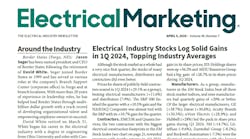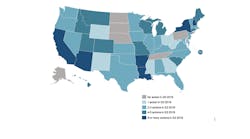The N.C. Clean Energy Technology Center (NCCETC) recently released its Q3 2019 Edition of the 50 States of Solar. This quarterly update provides insights on state regulatory and legislative discussions and actions on distributed solar policy, with a focus on metering, distributed solar valuation, community solar, residential fixed charges, residential demand and solar charges, third-party ownership, and utility led solar programs.
The report finds that 42 states plus the District of Columbia took some type of distributed solar policy action during Q3 2019. Most actions continued to address net metering policies, residential fixed charge, minimum bill increases and community policies.
A total of 150 distributed solar policy actions were taken throughout this quarter, with the most actions taken in CA, NY AZ, AR, NH and LA.
The report identifies three primary trends throughout Q3 2019: utilities proposing more modest residential fixed charge increases; states considering credit adders for community solar projects serving low-income customers; and stakeholders reaching agreements on net metering reform in some states but not others.
“While we’re seeing more instances of collaboration and compromise on net metering successor tariffs, these decisions are still proving to be quite contentious in some states,” observed Autumn Proudlove, lead author of the report and senior manager of policy research at NCCETC. “In general, states taking a value-based approach to credit rates, rather than a strict avoided cost approach, are seeing more agreement among stakeholders.”
The report also highlights the top five policy developments of Q2 2019:
- The LA Public Service Commission approving major net metering reforms;
- CT regulators filing proposed shared solar program rules;
- Xcel Energy requesting changes to the value of solar methodology in MN;
- The HI Public Utilities Commission opening a new proceeding on distributed energy resources; and
- MA regulators rejecting National Grid’s proposed minimum monthly reliability contribution for net metering customers.
“With most state legislatures adjourned for the year, we’ve seen an increase in regulatory activity,” noted Brian Lips, senior policy project manager at NCCETC. “New proceedings were opened in a number of states, including Kentucky and Maine, to implement legislation passed earlier in the year.”
Click here to view the executive summary or purchase the full report here.









